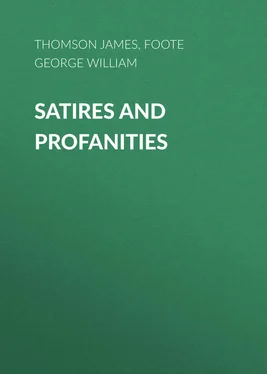George Foote - Satires and Profanities
Здесь есть возможность читать онлайн «George Foote - Satires and Profanities» — ознакомительный отрывок электронной книги совершенно бесплатно, а после прочтения отрывка купить полную версию. В некоторых случаях можно слушать аудио, скачать через торрент в формате fb2 и присутствует краткое содержание. Жанр: foreign_religion, foreign_antique, foreign_prose, на английском языке. Описание произведения, (предисловие) а так же отзывы посетителей доступны на портале библиотеки ЛибКат.
- Название:Satires and Profanities
- Автор:
- Жанр:
- Год:неизвестен
- ISBN:нет данных
- Рейтинг книги:4 / 5. Голосов: 1
-
Избранное:Добавить в избранное
- Отзывы:
-
Ваша оценка:
- 80
- 1
- 2
- 3
- 4
- 5
Satires and Profanities: краткое содержание, описание и аннотация
Предлагаем к чтению аннотацию, описание, краткое содержание или предисловие (зависит от того, что написал сам автор книги «Satires and Profanities»). Если вы не нашли необходимую информацию о книге — напишите в комментариях, мы постараемся отыскать её.
Satires and Profanities — читать онлайн ознакомительный отрывок
Ниже представлен текст книги, разбитый по страницам. Система сохранения места последней прочитанной страницы, позволяет с удобством читать онлайн бесплатно книгу «Satires and Profanities», без необходимости каждый раз заново искать на чём Вы остановились. Поставьте закладку, и сможете в любой момент перейти на страницу, на которой закончили чтение.
Интервал:
Закладка:
Mr. Jenkins compiles and publishes a book of “Selections from the Bible,” carefully excluding all passages relating to the Devil and evil spirits. The book is bulky; and, in fact, though this is not expressly stated, seems to contain pretty well all the Bible except such passages. He further exhibits in the case a book of selections from the liturgy of the Church of England, apparently compiled on the same principle of exclusion.. Mr. Cook sends through Mrs. J. a message: “Let Mr. J. write me a calm letter, and say he believes in the Devil, and I will give him the Sacrament.” Mr. J. replies, as we have seen, that the parts he has omitted are, in his opinion, quite incompatible with religion or decency, in their generally received sense ; such generally received sense being evidently (to all of us save their most learned and subtle lordships) that in which the Church of England receives them. Mr. C. replies, “Then I must refuse you the Communion.” Mr. J. answers, “Thinking as you do, I do not see what other course you could con-. sistently have taken;” and resolves to test the question of legality. With these facts staring them in the face, their most learned and most subtle lordships can, with the utmost solemnity, and in the most emphatic manner, declare that there is not any evidence before them that Mr. Jenkins does not believe in the Devil in the common Church of England sense! What the eyes of laymen, however purblind, cannot help seeing clearly, their far-sighted lordships, putting on legal spectacles, dim with the dust of many ages, manage not to discern at all.
The question cannot be left thus undecided. As matters stand, the poor Church does not know whether, legally, it has a Devil or not. Its Devil, its dear and precious old Devil, is in a state of suspended animation, neither dead nor alive; a most inefficient and burdensome Devil. He must either be restored to full health and vigor, or buried away decently for ever; decently and solemnly, the Archbishop of Canterbury, in the presence of all their lordships of the Judicial Committee of the Privy Council, reading the appropriate Church service over his grave. That would be touching and impressive! – “Forasmuch as it hath pleased Almighty God (with the sanction and authority of the Judicial Committee of the Privy Council) of his great mercy to take unto himself the soul of our dear brother here departed, we therefore commit his body to the ground; earth to earth, ashes to ashes, dust to dust; in sure and certain hope of the resurrection to eternal life, through our Lord Jesus Christ.” At present it appears that every clergyman and layman in the Church has the legal right to sing as a solo in private, especially if solicited, Beranger’s refrain, “ The Devil is dead! The Devil is dead! ” while it is doubtful whether he is at liberty to chant it publicly and in chorus – a state of things anomalous beyond even the normal anomalism of all things in this our happy England. It is urgent that some one, lay or cleric, should compel the decision which the suit of Mr. Jenkins has failed to obtain.
In considering the question whether disbelief in the Devil would “deprave” the Prayer Book, we must refer to this book itself. It contains three creeds – the Apostles’, the Nicene, and that called of Athanasius. Of these the Nicene (the creed in the Communion Service, by the way) mentions neither the Devil nor Hell; the Apostles’ and the so-called Athanasian mention hell but not the Devil. In No. III. of the Thirty-nine Articles hell is solidly established, but again there is no mention of the Devil. It may be argued that hell implies the Devil, as a fox-hole implies a fox; but his existence is not authoritatively averred. Strangely enough, the only personage who, according to the creeds and articles, has certainly been in hell, is Jesus Christ himself: “He descended into hell; the third day he rose again from the dead; he ascended into heaven.” What took him to hell? The Prayer Book does not inform us. But we learn from the Epistle called 1 Peter, chap. iii., 19, 20, and chap. iv., 6: “By which also he went and preached unto the spirits in prison, which sometime were disobedient, when once the long-suffering of God waited in the days of Noah, while the ark was a preparing, wherein few, that is eight souls, were saved by water… For this cause was the gospel preached also to them that are dead, that they might be judged according to men in the flesh, but live according to God in the spirit.” Whence it appears that the spirits in prison were not the Devil and his angels, but the spirits of those who were drowned in the Flood for disobedience; and it furthermore appears that these spirits were saved by the preaching of Christ; so that in this famous harrying of hell, he seems to have left it as empty as the mosstroopers in their forays left farmsteads. It is true that No. VI. of the Articles settles the canon of the Old and New Testaments, and that anyone daring to exclude from belief anything in this canon might be convicted of depraving the Prayer Book. But in that case all the best scholars and divines of the Church are guilty of this dreadful sin; and not only guilty, but openly, commonly and notoriously guilty: and therefore all merit repulsion from the Lord’s table. Let the truly faithful clergy, those who believe all without question or distinction, do their duty to the Articles of religion of their Church (the Creeds, as I have pointed out, are neutral), and they will shut out from their Communion nearly all the intelligent piety and learning which lend it whatever dignity it still retains. Granted the canon in its integrity, and the existence of a personal Devil, and the doctrine of eternal punishment cannot be fairly disputed. Without multiplying texts, I may refer to Revelation, chap. xx., as decisive on these points.
From these considerations it follows that if the Church of England is bound by her own articles she will hold fast to the Devil and hell, and deny the privilege of her Communion to any one who depraves the Prayer-Book by common and notorious disbelief in them. And for my own part, I do not see how the Church could get on at all without a Devil and hell, especially in competition with the other Christian sects, which make unlimited use of both. The Devil is in fact as essential to the Christian schemes as a leader of the opposition to that great political blessing, government by party. If he were to die, or be deposed, it would be necessary to elect another to the vacant dignity. You cannot put the leadership in commission as the unfortunate Liberals were taunted with doing, in their demoralisation after their disasters of the General Election and Mr. Gladstone’s sudden retirement. Just as Mr. Disraeli lamented the withdrawal of Mr. Gladstone, complaining of the embarrassment caused to the Government by having no responsible leader opposed to it, so we can imagine dear God lamenting the absence of a Devil, and declaring that the Christian scheme could not work well without one. His utter loss would make the government of the world retrograde from an admirably balanced constitutional monarchy to a mere Oriental absolute despotism. You must choose some one to lead, if only in name and for the time, as the Whigs chose Lord Hartington. But though Lord Hartington is still tolerated by us English, a Lord Hartington of a Devil, be it said with all respect to both his lordship and his Devil-ship, would scarcely be tolerated by either the celestial or the infernal benches.
In Beranger’s authentic record, already alluded to, of “The Death of the Devil” – which, however, relates only to the Church of Rome – we read how, on learning the catastrophe: —
“The conclave shook with mortal fear;
Power and cash-box, adieu! they said;
We have lost our father dear,
The Devil is dead! the Devil is dead!”
Интервал:
Закладка:
Похожие книги на «Satires and Profanities»
Представляем Вашему вниманию похожие книги на «Satires and Profanities» списком для выбора. Мы отобрали схожую по названию и смыслу литературу в надежде предоставить читателям больше вариантов отыскать новые, интересные, ещё непрочитанные произведения.
Обсуждение, отзывы о книге «Satires and Profanities» и просто собственные мнения читателей. Оставьте ваши комментарии, напишите, что Вы думаете о произведении, его смысле или главных героях. Укажите что конкретно понравилось, а что нет, и почему Вы так считаете.












